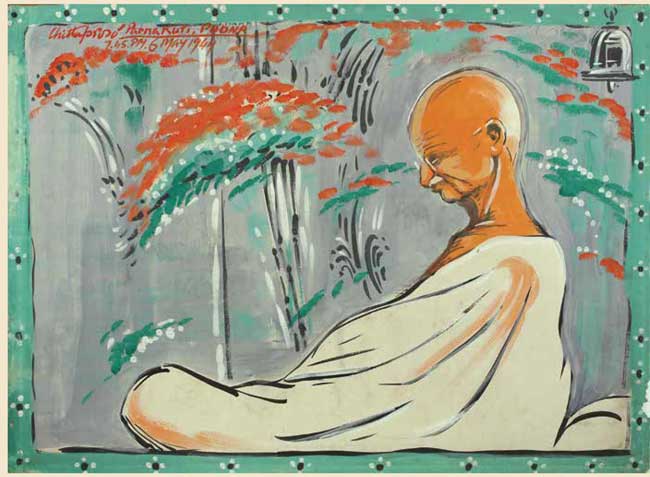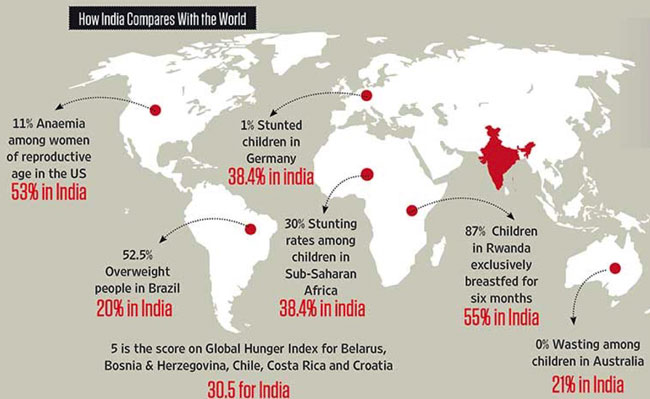“We shall first have to give up this hubris of considering tribes backward. Every tribe has a rich and living cultural tradition and we must respect them.” – Vice President M. Venkaiah Naidu on the constitutional obligation to respect the cultural traditions of India’s tribal communities

Gandhian social movement | Constitution | Adverse inclusion >>
“Air is free to all but if it is polluted it harms our health… Next comes water… From now on we must take up the effort to secure water. Councillors are servants of the people and we have a right to question them.” – Mohandas K. Gandhi, Ahmedabad address on 1 January 1918; quoted by his grandson, Gopalkrishna Gandhi, in “On another New Year’s Day: Mahatma Gandhi’s ‘khorak’ a 100 years ago” (The Hindu, 1 January 2018)
“The world has enough for everyone’s need but not for anyone’s greed.” – Mahatma Gandhi quoted by Medha Patkar and Baba Amte (Narmada Bachao Andolan)
The abominable plight of migrant workers in recent weeks has invaded television screens and stirred the nation’s conscience. Alas, this is just the tip of the wave of hardships that is sweeping through the country. The situation looks increasingly alarming in the light of a series of surveys conducted by Azim Premji University (APU) and other institutions. The APU survey, for instance, found that 74% of the respondents (thousands of poor households scattered over many States) were “consuming less food” today than before the lockdown. Another survey, conducted by Farzana Afridi and her colleagues in low-income neighbourhoods of Delhi, found that 80% of the respondents had not earned any income during the lockdown, 90% reported “financial stress”, and about half were too anxious to sleep at night. […]
In the old days (good or bad), workers were allowed to turn up at the worksite and enrol on the spot. That made things easier for them: applying for work was a right, not an obligation. But now, it has become an obligation: no-one can be employed unless his or her name has been entered in advance in the e-muster rolls. Most workers have no idea how to go about this. […]
Jean Drèze is Visiting Professor at the Department of Economics, Ranchi University
Source: “The need for a million worksites now” by Jean Drèze
URL: https://www.thehindu.com/opinion/lead/the-need-for-a-million-worksites-now/article31665949.ece
Date visited: 25 May 2020
Research on related issues undertaken by Azim Premji University (Bengaluru) >>
It is possible to have a better life for Scheduled Tribes in India!
Read the full post by Prof. V. Santhakumar >>
[…] The relative backwardness of scheduled tribes may not disappear through the overall development of a state and that may require special efforts. This is evident from the situation in the state of Kerala. Rural poverty among STs in the state is more than two-and-a-half times of that among its rural population as a whole[1].
However, the life of Scheduled Tribes in certain parts of India is relatively better. The state of Mizoram and other states in North-East India are one such case. What has enabled the human development of ST population in North-East India (compared to other parts of the country) is an interesting question and we will discuss that in another essay. […]
The relative improvement in Gadchiroli becomes clearer when we note the situation in the adjoining districts of Dantewada and Bastar in the state of Chhattisgarh.
Our short-period field work in the northern blocks of Gadchiroli district (Kurkheda and Korchi) in December 2017 also indicate a relatively better situation there. Tribal families use traditional methods to construct hygienic and comfortable houses. They have access to electricity and drinking water. Households have constructed toilets and there are no visible signs of open defecation. Almost all children go to primary school (located mostly within the village), though there is dropping out after completing 10th grade. There are boys and girls from these hamlets who pursue graduate and post-graduate education. The discussions with people there confirm that there is no serious issue of food poverty, and this could be due to the access to land and also the functioning of the public distribution system. Almost all households have land and these could be of reasonable size (3-5 hectares). Since these hamlets are surrounded by forests, the agricultural land is fertile and can be used for one cropping of paddy cultivation. However, their main source of income is through the collection and sale of Non-Timber Forest Products, facilitated through the community rights under the so called `Forest Rights Act’. […]
Though the institution of Forest Rights Act is a policy action on the part of governments, local mobilisation among Tribal population, and non-governmental organisations have played an important role in its effective implementation. This area has witnessed different forms of social mobilization under leaders coming from tribal communities. […]
Bamboo plantations were developed through the collective action in the community forest area. Bamboo is an important source of income for the tribal population, and a process of harvesting without replantation may work against the sustainability of this income. Hence planning and implementing a project for bamboo harvesting and cultivation are important for the sustained welfare of the population here.
In summary, relatively better human development indicators of the tribal population in the northern bock of Gadchiroli district seem to be shaped by the social and political activism of the tribal leaders and the constructive work and the capacity building of organisations such as Amhi Amchya Arogyasathi. […]
V Santhakumar, a Professor at Azim Premji University [Bangalore], writes on contemporary or real world issues with a lens of economics or social sciences. He teaches economics for development practitioners in the university, and carries out research on education and development issues. His details can be seen in https://azimpremjiuniversity.edu.in/SitePages/v-santhakumar.aspx
Source: https://vsanthakumar.wordpress.com/2018/05/04/it-is-possible-to-have-a-better-life-for-scheduled-tribes-in-india/
Accessed: 4 May 2018
The Lonely Battle of the Indian Farmer
by Vinay Lal, December 6, 2018[…] Volume Two of the Fifth and Final Report of the Swaminathan Commission commences with two epigrams, one from Gandhi—“To those who are hungry, God is bread”—and the other from Nehru: “Everything else can wait, but not agriculture.” The majority of Indian farmers and members of their households have only two meals a day, and at least 10% have only one meal a day. That those whose labour helps put the food on the tables in the country’s towns and cities should not have enough food for themselves is particularly odious and cruelly ironic. The indisputable fact is that a third of the world’s malnourished children live in India, just as it is clear that the problem is not one of scarcity but rather of accessibility to food. | Read the full blog post >>
(Vinay Lal is a writer, blogger, cultural critic, and Professor of History at UCLA.)
Source: Lal Salaam: A Blog by Vinay Lal >>
URL: https://vinaylal.wordpress.com/2018/12/06/the-lonely-battle-of-the-indian-farmer/
Date visited: 6 December 2018
M S Swaminathan Research Foundation (MSSRF) established in 1988 is a not-for-profit trust. MSSRF was envisioned and founded by Professor M S Swaminathan, agriculture scientist with proceeds from the First World Food Prize that he received in 1987. The Foundation aims to accelerate use of modern science for sustainable agricultural and rural development. MSSRF focuses specifically on tribal and rural communities with a pro-poor, pro-women and pro-nature approach. The Foundation applies appropriate science and technology options to address practical problems faced by rural populations in agriculture, food and nutrition.
Source: Harnessing Science for Sustainable Development: About MSSRF
URL: https://www.mssrf.org
Date visited: 6 December 2018
[Bold typeface added above for emphasis]

Graphic © Outlook India 26 August 2019 | Enlarge >>
“The tribal food basket has always been diverse and nutritious” >>
“Health spending by the Indian government as percentage of GDP has long been one of the lowest for any major country, and the public health system is chronically dismal.” – Pranab Bardhan in “The two largest democracies in the world are the sickest now” | Learn more: Scroll.in, 24 August 2020 >>
Find scholarly books, poetry and fiction relating to tribal culture – Indian publishers
List of sites covered by this Google custom search engine
To find children’s and educational books or search Indian periodicals, magazines, web portals and other sources safely, click here >>
Search tips
Combine the name of any particular state, language or region with that of any tribal (Adivasi) community.
Add keywords of special interest (music, poetry, dance just as health, sacred grove and biodiversity); learn about the rights of Scheduled Tribes such as the “Forest Rights Act” (FRA); and the United Nations “Declaration on the Rights of Indigenous Peoples”, “Universal Declaration of Human Rights”, “women’s rights”, or “children’s right to education”.
Specify any other issue or news item you want to learn more about (biodiversity, bonded labour and human trafficking, climate change, ecology, economic development, ethnobotany, ethnomedicine, global warming, hunter-gatherers in a particular region or state, prevention of rural poverty, water access).
For official figures include “scheduled tribe ST” along with a union state or region: e.g. “Chhattisgarh ST community”, “Himalayan tribe”, “Scheduled tribe Tamil Nadu census”, “ST Kerala census”, “Particularly Vulnerable Tribal Group Jharkhand”, “PVTG Rajasthan”, “Adivasi ST Kerala”, “Adibasi ST West Bengal” etc.
In case the Google Custom Search window is not displayed here try the following: (1) toggle between “Reader” and regular viewing; (2) in your browser’s Security settings select “Enable JavaScript” | More tips >>
Note: hyperlinks and quotes are meant for fact-checking and information purposes only | Disclaimer >>
See also
Forest Rights Act (FRA) | Legal rights over forest land
Health and nutrition | Recommendations by the Expert Committee
People’s Archive of Rural India (PARI) | RuralIndiaOnline.org
States along the Narmada river’s course (source to Arabian Sea):
Madhya Pradesh | Maharashtra | Gujarat